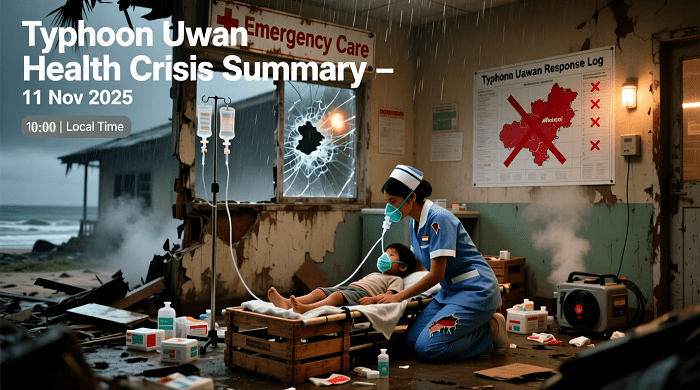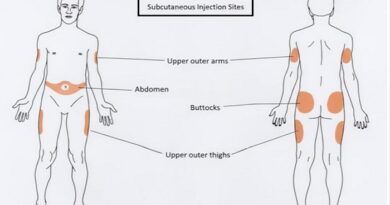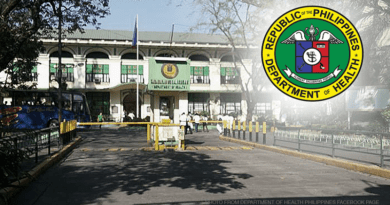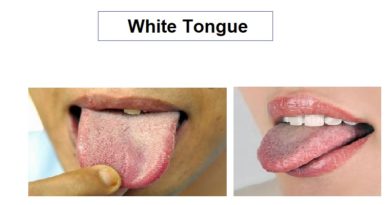Stay Safe! Your Health Guide to Typhoon Uwan (November 11)
Typhoon Uwan (International Name: Fung-Wong) has intensified. It is posing a major threat to many locations of the Philippines which is particularly significant in Luzon and Visayas. As the storm moves closer, the Department of Health (DOH) is on high alert. They are warning the public about immediate disaster threats. They also warn about the secondary wave of illnesses that follow heavy flooding.
Your best defense right now is preparation and knowledge. These are the essential health advisories you need to know. Here are the safety tips to protect your family before, during, and after Typhoon Uwan.
1. DOH on High Alert: What Government is Doing
Health authorities are not taking the threat lightly, especially the recent devastation left by Typhoon Tino.
- Code Blue Alert:
The DOH has activated a Code Blue Alert. This signifies full preparedness of hospitals and medical teams. They are ready in anticipation of a high volume of patients. Hospitals in Northern and Central Luzon have already expanded their bed capacities. - Medical Supplies Pre-positioned:
Millions of pesos worth of essential medicines, hygiene kits, and water-related supplies have been pre-positioned. This includes chlorine tablets for purification. They are positioned in regions, including Bicol, to make sure continuity of care. This ensures access to supplies even if roads become impassable. - Evacuation is a Health Measure:
DOH spokesperson Asec. Albert Domingo reminded the public that immediate evacuation is crucial when advised by local government units (LGUs). It is the most important health measure to prevent injury and death.
Sources:
DOH prepositions P8-M worth of health commodities for Bicol (The Manila Times, Nov 9, 2025)
OCD: Typhoon Uwan affects 54 provinces, Metro Manila (ABS-CBN News, Nov 8, 2025)
2. The Biggest Post-Typhoon Health Risks (And How to Avoid Them)
While the winds and rain subside, the danger shifts to water-borne diseases. The DOH is closely monitoring possible increases in several illnesses, especially in flood-affected areas.
| Health Risk | Prevention Tips |
| Leptospirosis | Avoid wading in floodwaters completely. If you must, wear waterproof boots (or high, closed shoes) and wash and dry your feet and legs afterward. Seek medical help if you develop fever, muscle pain, or yellowing skin. |
| Diarrhea & Cholera | These are caused by contaminated water. Only drink water that has been boiled, purified with chlorine, or is bottled. Use clean water for brushing teeth and washing dishes, even after the flood recedes. |
| Respiratory Illnesses | Evacuation centers are often crowded. Keep social distancing when possible. Wear a mask if you have a cough. Avoid spreading airborne illnesses like the flu or COVID-19. |
| Electrical Hazards | Turn off the main power breaker of your home if you evacuate or if floodwaters rise near outlets. Stay at least 10 meters away from downed power lines. |
Sources:
TIPS: Here’s how to prepare your condo or house for a typhoon (Philstar Life, Nov 7, 2025)
DOH prepositions P8-M worth of health commodities for Bicol (The Manila Times, Nov 9, 2025)
3. Essential “Go Bag” Check for Your Health
If you are asked to evacuate, your Go Bag (or Emergency Kit) is your most vital health asset. Before Typhoon Uwan hits, check these items:
- Prescription Medications:
Keep at least a 3-day supply of all necessary maintenance medicines (for high blood pressure, diabetes, etc.). - First-Aid Kit:
Include antiseptics, bandages, pain relievers (like Paracetamol), and anti-diarrhea medicine. - Hygiene Essentials:
Soap, toothpaste, feminine hygiene products, and alcohol/sanitizer. - Documentation: Place copies of vital health records in a sealed plastic bag. This includes prescriptions, your PhilHealth card, and hospital contacts. The sealed bag will keep them dry.
Sources:
Weather Alert: Preparing for Typhoon Uwan (Fung-wong) (U.S. Embassy in the Philippines, Nov 7, 2025)
‘Uwan’ nears the Philippines: What families should do before it hits (Philstar, Nov 7, 2025)
Summary and Call to Action
The message from the government and health sector is unified: Heed the warnings and focus on immediate safety. The threat of Typhoon Uwan is immense, and post-disaster health risks like Leptospirosis Prevention need proactive steps today. Please follow evacuation orders, prepare your Go Bag, and make sure your family avoids all contact with floodwaters. Staying safe is the most effective form of disaster medicine.




